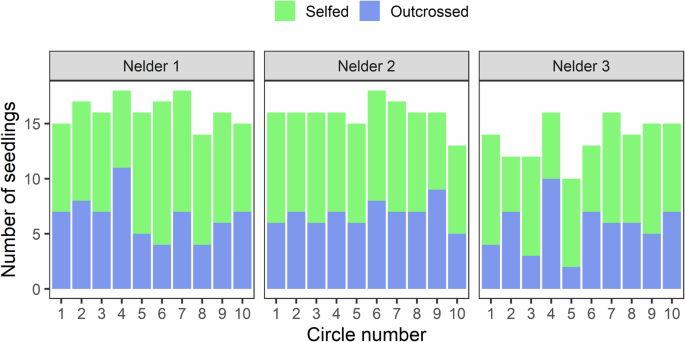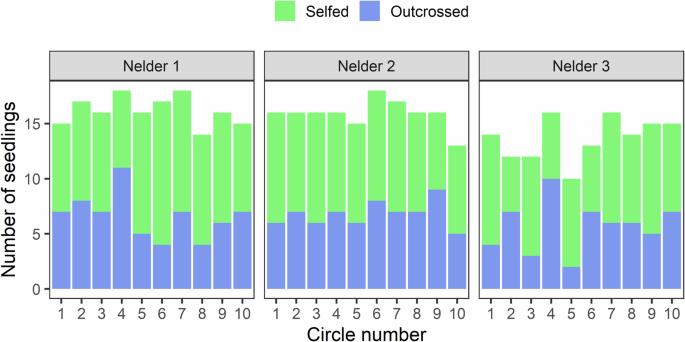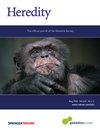Inbreeding depression affects the growth of seedlings of an African timber species with a mixed mating reproductive system, Pericopsis elata (Harms) Meeuwen
IF 3.9
2区 生物学
Q2 ECOLOGY
引用次数: 0
Abstract
Selfing or mating between related individuals can lead to inbreeding depression (ID), which can influence the survival, growth and evolution of populations of tree species. As selective logging involves a decrease in the density of congeneric partners, it could lead to increasing biparental inbreeding or self-fertilization, exposing the population to higher ID. We assessed the influence of inbreeding on the growth of a commercial timber species, Pericopsis elata (Fabaceae), which produced about 54% of self-fertilized seedlings in a natural population of the Congo basin. We followed the survival and growth of 540 plants raised in a plantation along a gradient of plant density (0.07–15.9 plants per m2). Parentage analysis allowed us distinguishing selfed and outcrossed seedlings. The annual growth was higher for outcrossed than selfed plants, on average by 10.8% for diameter and 12.9% for height growth. Based on the difference in above ground biomass between selfed and outcrossed seedlings after 41 months, we estimated the level of ID at δ = 0.33, while a lifetime estimate of ID based on the proportions of selfed plants at seedling and adult stages led to δ = 0.7. The level of ID on growth rate did not change significantly with age but tended to vanish under high competition. Pericopsis elata is a particularly interesting model because inbreeding depression is partial, with about 26% of reproducing adults resulting from selfing, contrary to most tropical tree species where selfed individuals usually die before reaching adulthood. Hence, the risks of ID must be considered in the management and conservation of the species.


近亲繁殖抑制影响具有混合交配生殖系统的非洲木材树种 Pericopsis elata (Harms) Meeuwen 的幼苗生长
亲缘个体之间的自交或交配会导致近亲繁殖抑制(ID),从而影响树种的生存、生长和种群进化。由于选择性伐木会降低同源伙伴的密度,因此可能会导致双亲近交或自交的增加,使种群面临更高的近交抑郁。我们评估了近亲繁殖对商业用材树种 Pericopsis elata(豆科)生长的影响,在刚果盆地的一个自然种群中,该树种的自交苗约占 54%。我们沿植物密度梯度(每平方米 0.07-15.9 株)跟踪了种植园中 540 株植物的存活和生长情况。通过亲本分析,我们可以区分自交苗和外交苗。外交植株的年生长量高于自交植株,直径平均增长 10.8%,高度平均增长 12.9%。根据 41 个月后自交和外交幼苗地上生物量的差异,我们估计 ID 水平为 δ = 0.33,而根据幼苗期和成株期自交植株的比例进行的终生 ID 估计值为 δ = 0.7。ID对生长率的影响程度并不随年龄的增长而显著变化,但在高度竞争的情况下则趋于消失。Pericopsis elata是一个特别有趣的模型,因为近亲繁殖抑制是部分的,约26%的繁殖成体来自自交,这与大多数热带树种相反,自交个体通常在成年之前就死亡了。因此,在管理和保护该物种时必须考虑到自交系的风险。
本文章由计算机程序翻译,如有差异,请以英文原文为准。
求助全文
约1分钟内获得全文
求助全文
来源期刊

Heredity
生物-进化生物学
CiteScore
7.50
自引率
2.60%
发文量
84
审稿时长
4-8 weeks
期刊介绍:
Heredity is the official journal of the Genetics Society. It covers a broad range of topics within the field of genetics and therefore papers must address conceptual or applied issues of interest to the journal''s wide readership
 求助内容:
求助内容: 应助结果提醒方式:
应助结果提醒方式:


